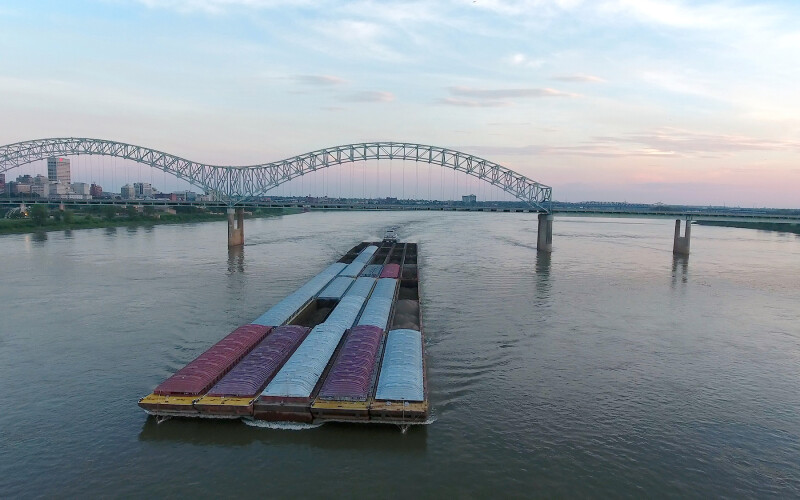Barge operators have always been resilient in times of economic or natural challenges, adapting their businesses to high water, low water, hurricanes, drops in demand for coal, petroleum or grain, and unexpected lock and dam closures.
But uncertainties emanating from erratic and unprecedented trade policies by the Trump administration have caused new anxieties and unwelcome business uncertainties for the industry.
In April, a trade war led by Trump’s drive to level the global trade playing field, spiked U.S. tariffs on imported goods to the highest in a century and sent the world economy and stock markets into chaos. After an immediate uproar, the president delayed most tariffs until July, but kept a 10% rate on most countries while piling more penalties on China. Meanwhile, China responded with similar levies on trade with the United States, and has moved to increase its soybean purchases from Brazil, a big U.S. competitor to U.S. farmers.
Tariffs in any form worry barge operators because they can hurt demand and pricing of barged commodities like export grains and coal, and hike prices for vessel spare parts made overseas or manufactured with imported materials, while also increasing the cost of building new vessels.
Just before the tariffs were announced, another trade initiative intended to challenge the dominance of China in global shipping, sent chills down the spine of many sectors of the maritime industry, including inland operators that move commodities arriving or departing U.S. ports.
On Feb. 27 the United States Trade Representative, the administration’s top trade official, announced a set of recommendations to counter China’s maritime and global shipbuilding ambitions. The most controversial would impose fees of up to $1.5 million on Chinese-built, operated, or flagged ships arriving in U.S. ports, and assess fees on vessels manufactured elsewhere if they are operated by carriers with fleets that include Chinese-made vessels.
The proposal is supported by many labor unions, steel companies and members of Congress who say fees will help revive the U.S. shipbuilding industry. But it has met very strong opposition from domestic retailers, importers, exporters, manufacturers, maritime companies, seaports, and international shippers and shipowners who predict the fees will raise prices for consumers and business and lead to major shifts in the nation’s port and transportation industries.
Barge operators would be swept into the economic fallout, especially those hauling export coal and soybeans to U.S. ports where the cargo is loaded onto Chinese-made vessels. They are most concerned that many foreign ships might bypass U.S. ports to avoid fees and head to ports in Canada or Mexico, and that demand for U.S grains and coal could collapse as China buys from other world producers.
“The uncertainty of whether or not ships will call at U.S. ports is a big concern for barge operators,” said Tracy Zea, president of the Washington-based Waterways Council, Inc., which advocates for waterways funding and whose members include barge companies. “We can move as much tonnage as we want down South to export, but if there are no ships to take it or if the price is too high, there will definitely be the potential to have commodities shift” to other transportation modes.
If the fees go into effect as proposed, such a shift could last a long time, given the 20-25 year lifespan of a commercial vessel, said Peter Stephaich, executive chairman of Campbell Transportation Company, Inc., a Pittsburgh-based inland marine transportation and services company with operations on the Ohio River and Gulf Coast. “This could affect exports for many, many years until we can build ships elsewhere. Given the current shipbuilding capacity, it would take maybe 10-15 years to replace these Chinese ships with non-Chinese ships.”
If customers take their coal and grain business elsewhere, Stephaich told WorkBoat that barge companies would likely drop their rates and “go after whatever other business they can get. If the rates get so low, there’s a point where it would be cheaper to just tie up barges rather than running them. This would cause an excess of supply in the market for barges and cause rates to go down domestically.”
Right now there is a good equilibrium between demand and supply of barges, he said, and upsetting that equation would have a negative impact on all dry cargo barge companies, especially those operating without long-term contracts or the ability to pass surcharges onto customers.




